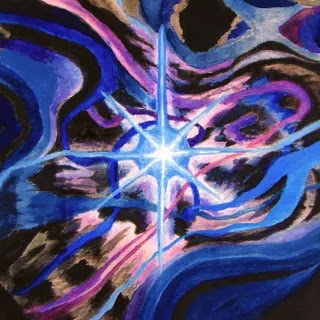Brooklyn songwriter Zannie Owens’ debut is a loose concept album about a lost alien—and an opaque inquiry into the shifting nature of reality.
Zannie Owens opens their full-length solo debut, How Do I Get That Star, with a Major Tom moment. In “mechanical bull,” the Brooklyn-based songwriter makes a sudden loss of contact with reality feel more sublime than worrisome, like getting mesmerized by the sun’s glow without the retinal damage. “I fumble with the airlock and then capitulate,” they sing calmly, shrugging off a terrifying experience with a lofty question: “Is there such a thing as real or fake?/I press my cheek to the stuff dark matter generates.” Zannie folds into the stardust and space debris, acting as a vessel for an otherworldly odyssey.
How Do I Get That Star is a concept album based on the story of a lost alien finding its way home. The narrative threads loosely through the album, which often feels like whimsical sci-fi expressed through free association and dream logic. Zannie cites the legacy of the Golden Record aboard the Voyager spacecraft and the midcentury poet Jack Spicer, who envisioned poets as conduits for some other lifeform, like ghosts or aliens. Sometimes Zannie’s own convoluted language and spacey observations read as though the details got lost in transmission. But like their muses, they seek a kind of authenticity in the unknowable—a way to break the loop of earthly reality—and they find it in quirky synth-pop tunes with the color and whimsy of a Fisher-Price toy.
Whether or not it’s clear what’s going on in the narrative, How Do I Get That Star is often melodically charming and vocally captivating. Owens’ melodies are decadent and playful as costume jewelry: On the highlight “for a while,” their silvery vocals contrast pleasantly with a bouncing polka beat and soulful pedal steel. Their vocal delivery, which can vary from sing-songy to a breathy flutter, is matched with peculiar percussive zaps, warped guitars, or a thin trap beat.
While the sound of the record is inviting, its layered conceptual subtleties itch to be solved. On “holy ghosted,” Zannie pines for another person’s electricity; on “poison plant,” they fret over the type of energy they bring into the room (“I just want to purify the air just like a tall tree/But I feel like a poison plant sucking life from my apartment”). “Am I just a sound?” they ask on “song of rose pain.” At times their lyrics unfold like scientific parables. On the woozy, baroque closer “Doppler,” Zannie calls out someone whose personality seems to change based on other people’s perceptions, comparing their behavior to the phenomenon observed in wave frequencies. “You were always trying to cheat time,” they sing in a pearlescent falsetto. It could be a simple change of heart or the transits of a corrupt time traveler. And yet, whether they’re channeling a lost Martian or untangling their own complex thoughts about connection and human existence, Zannie’s sweetly synthetic pop melodies make the big ideas feel deceptively close to earth.



0 comments:
Post a Comment